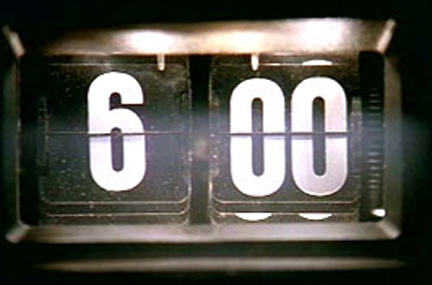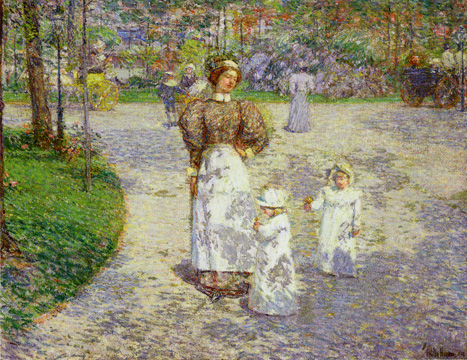 I’m up my ears in work in New York, Mrs. T is up in Connecticut taking care of various chores, and neither of these things will be changing until Sunday. As a result, I was feeling more than a little bit grumpy when I sat down in front of the TV on Friday night, surfed the channels, and settled on Groundhog Day, a movie that I love but hadn’t seen in several years.
I’m up my ears in work in New York, Mrs. T is up in Connecticut taking care of various chores, and neither of these things will be changing until Sunday. As a result, I was feeling more than a little bit grumpy when I sat down in front of the TV on Friday night, surfed the channels, and settled on Groundhog Day, a movie that I love but hadn’t seen in several years.
Later that same evening, I emitted a burst of tweets which, stitched together, read as follows:
I’m in the middle of a major writing project (not the Ellington biography) that’s giving me a bad case of the ups-and-downs. What I’d like to do is leave my computer behind and hole up on Isle au Haut for a couple of work-free weeks. Alas, this is not an option. I’ll have to settle for a nice long walk in Central Park, which is far from the worst of a bad bargain.
If you need to adjust your attitude–and I did–a repeat viewing of Groundhog Day will likely do the trick. I laughed and laughed, then found myself overcome with gratitude at film’s end. I’m the luckiest person I know, and sometimes I forget it. Not tonight, though.
To which Lileks responded as follows: “Gratitude! That’s precisely the reaction I have to cheer-inducing, optimistic art. It’s a profound and underrated emotion.” And so it is, especially the latter. Among other things, that’s why Mozart has always been more widely celebrated than Haydn, an equally great composer whose music, though anything but ignorant of the world’s sorrows, is nonetheless fundamentally optimistic and hopeful. Under the aspect of modernity, we prefer our geniuses to be bleak, believing as we do that life is real, earnest, and not infrequently grim. Except that it isn’t, at least not always, and to forget that fact is to commit the soul-shriveling sin of ingratitude.
In a piece I wrote about Haydn for Commentary back in 2005, I quoted the following statement that has been attributed to the composer:
Often when contending with obstacles of every sort that interfered with my work… a secret feeling within me whispered: “There are but few contented and happy men here below; grief and care prevail everywhere; perhaps your labors may one day be the source from which the weary and worn, or the man burdened with affairs, may derive a few moments’ rest and refreshment.” What a powerful motive for pressing onward!
And what an equally powerful motive for seeking to make optimistic art.
The truest and best sentence in Pops: A Life of Louis Armstrong, if I do say so myself, is the one in which I described Armstrong as “a major-key artist who would always be disinclined to lament the woes of the world, aware of them though he was.” I coined the phrase “major-key artist” long ago to describe my old friend Nancy LaMott, who contended with the brutal and debilitating frustration of chronic illness, yet somehow contrived to fill her voice with the sunny warmth of hope each time she raised it in song.
Would that I could do that, or something like it! Alas, I’m merely a craftsman, not a great artist, but at least I can do my best to remind my readers of the life-enhancing virtues of such other joy-inspiring masters as (to name a few off the top of my head) Sir Thomas Beecham, Pierre Bonnard, Emmanuel Chabrier, Noël Coward, Erroll Garner, Howard Hawks, Henri Matisse, Fairfield Porter, and Frank Lloyd Wright. And–lest we forget–Harold Ramis, the director of Groundhog Day, who may not be a master but who has certainly helped make the world a happier and more grateful place.
 As for my own fluctuating gratitude, it ran high all weekend long, fed by Saturday’s glorious sunshine and my first long walk through Central Park in far longer than I care to admit. I am, I know, absurdly lucky, lucky in love and friendship and, perhaps rarest of all, in work. No doubt I spend too much time at the grindstone, but how many people get to earn their living writing books about men like Louis Armstrong and reviews of shows like, say, Gordon Edelstein’s current off-Broadway revival of The Glass Menagerie? And how many working journalists get to change hats in the middle of life and collaborate with a great composer on an opera, then see it produced to perfection and cheered to the echo?
As for my own fluctuating gratitude, it ran high all weekend long, fed by Saturday’s glorious sunshine and my first long walk through Central Park in far longer than I care to admit. I am, I know, absurdly lucky, lucky in love and friendship and, perhaps rarest of all, in work. No doubt I spend too much time at the grindstone, but how many people get to earn their living writing books about men like Louis Armstrong and reviews of shows like, say, Gordon Edelstein’s current off-Broadway revival of The Glass Menagerie? And how many working journalists get to change hats in the middle of life and collaborate with a great composer on an opera, then see it produced to perfection and cheered to the echo?
I haven’t mentioned her lately in this space, so perhaps it’s worth saying that my mother did everything right (other than failing to teach me how to cook). Evelyn Teachout, who turns eighty-one in June, mysteriously neglected to make any of the all-too-familiar mistakes that blight the lives of so many of the people I know. She showed me how to laugh, admired my achievements, brushed off my failures, assured me whenever necessary that pretty much anything I wanted to do in life would be fine with her, and never left me in the slightest doubt of her love. She embedded in me what Freud called “that confidence of success that often induces real success.” You can’t get much luckier than that.
Each day is, of course, its own challenge, and I’m sure that I’ll forget to be grateful for all my good fortune at some particularly exasperating point in the week to come. But this posting, along with others like it that I’ve written in the seven years since this blog opened for business, is meant to serve as a marker, a permanent reminder of my obligation to appreciate all that is good, both in my own life and in the world around me.
Vladimir Nabokov said it: “The cradle rocks above an abyss, and common sense tells us that our existence is but a brief crack of light between two eternities of darkness.” Perhaps–but oh, how lovely a light!
